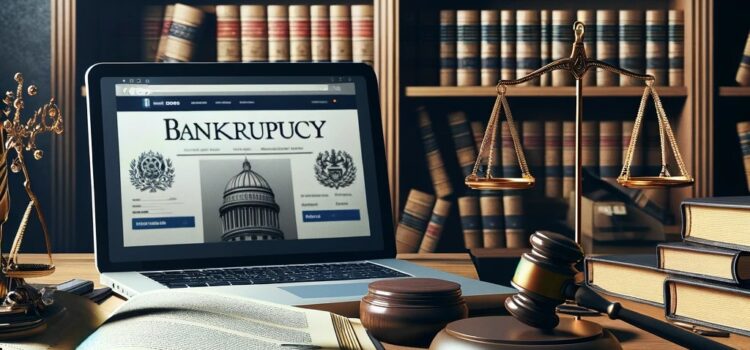
Chapter 7 bankruptcy in Oklahoma, like any state, is a serious legal process for people or corporations in financial distress. Chapter 7 bankruptcy, or “liquidation bankruptcy,” includes selling assets to pay off debts. This technique can help debtors with overwhelming debt start over financially. However, Oklahoma Chapter 7 bankruptcy processes and effects must be understood.
Oklahoma debtors must pass the means test, which assesses income and spending, to file Chapter 7 bankruptcy. The debtor’s six-month average monthly salary is compared to Oklahoma’s median household income in the means test. Debtors automatically qualify for Chapter 7 if their income is below the median. Further study is needed to determine disposable income and eligibility if their income exceeds the median.
Once eligible, the debtor must assemble substantial financial documents to submit bankruptcy filings with the bankruptcy court. Income statements, tax reports, asset values, debt schedules, and other financial documents are usual. Bankruptcy automatically freezes wage garnishments, foreclosures, and debt collection litigation.
Debt discharge for most unsecured debts.
Oklahoma Chapter 7 bankruptcy discharges unsecured obligations, which is a major advantage. Credit card, medical, and personal loan debts are unsecured. Chapter 7 bankruptcy involves liquidating non-exempt assets to pay creditors. The main benefit of Chapter 7 is the elimination of most unsecured debts, giving people a fresh financial start.
Debt relief is a major reason people file for Chapter 7 bankruptcy. Unsecured debts may quickly build, especially with high interest rates or unexpected medical bills. Chapter 7 bankruptcy can help people escape debt and recover financial control.
Creditors cannot seek to collect discharged unsecured debts. Telephone harassment, mailings, and wage garnishment are examples. Chapter 7 bankruptcy prevents creditors from collecting on discharged debts. This relieves debt collectors’ stress and worry.
A fresh financial start is another advantage of Chapter 7 bankruptcy for unsecured obligations. After paying off massive debt, people can regain their credit and financial security. Bankruptcy might temporarily lower one’s credit score, but it also offers a chance to build credit.
Additionally, Chapter 7 bankruptcy usually resolves faster than Chapter 13. Chapter 7 cases usually end within a few months, letting people to go on and restore their finances.
Note that Chapter 7 bankruptcy doesn’t discharge all obligations. But you can find answer to most popular question asked by almost everyone, can i file chapter 7 and keep my car? Generally, child support, alimony, most school loans, and some tax debts cannot be discharged but you can keep your car. However, elimination of most unsecured debts can still give substantial relief and improve financial prospects.
Automatic stay on creditor actions.
One of the biggest benefits of Oklahoma Chapter 7 bankruptcy is the automatic hold on creditor actions. Debtors can temporarily avoid collection operations, lawsuits, garnishments, foreclosures, and other creditor harassment with this legal protection.
All creditor collection operations stop when the bankruptcy petition is filed with the court. Creditors cannot personally contact debtors, file lawsuits, foreclose, repossess, or withhold wages or bank accounts. Debtors have breathing room and steadiness at a stressful period with the automatic stay.
The automatic stay allows debtors to focus on their bankruptcy case without creditor threats. It lets debtors work with their bankruptcy counsel to prepare their case, gather paperwork, and attend meetings and hearings without the stress of aggressive creditors.
The automatic stay also allows debtors to discuss settlements or repayment agreements with creditors outside of bankruptcy court. Instead of facing legal action, creditors may be more ready to negotiate agreements that benefit both sides.
The automatic stay might provide homeowners facing foreclosure time to consider loan modification, short sale, or deed in lieu of foreclosure. The automatic stay does not prevent foreclosure, but it can give debtors time to research options and cooperate with their mortgage lender to save their property.
The automatic stay can also cease wage garnishment and bank account levies immediately. Debtors can preserve their income and assets while filing for bankruptcy.
The automatic stay protects against creditor actions immediately, however there are exceptions and restrictions. The automatic stay does not apply to child support, alimony, or most tax arrears. Creditors can also petition the court for relief from the automatic stay if they can show that the debtor has no equity in the property and it is not needed for reorganization.
Generous exemption protections for essential assets.
Essential asset exemptions are a major benefit that can bring peace of mind. These exemptions let people continue living a modest lifestyle throughout bankruptcy.
Oklahoma bankruptcy filers are lucky to have exemption provisions that protect vital assets from creditors. These exclusions include residences, automobiles, household goods, retirement savings, and trade equipment.
The homestead is a major Oklahoma bankruptcy exemption. The homestead exemption lets people keep their principal dwelling up to a specific equity level. This safeguard keeps families in financial distress from becoming homeless during bankruptcy.
Due to the need of reliable transportation for work, education, and other activities, Oklahoma’s exemption rules safeguard cars. Filers can keep one or more automobiles up to a certain value to preserve mobility and employment.
Oklahoma’s bankruptcy exemptions protect household items and furniture. Furniture, appliances, clothing, and other necessities for everyday life are included. Personal and family stability may be maintained during difficult times by conserving these vital assets.
Oklahoma bankruptcy laws safeguard retirement savings, another important asset. 401(k) plans, IRAs, and pension funds are safeguarded so taxpayers may prepare for retirement without worrying about losing their investments.
Oklahoma’s exemption rules protect those who rely on specialized instruments or equipment. Machinery, instruments, and supplies for work or self-employment are usually protected from liquidation. This allows people to work and support their families.
Besides these exemptions, Oklahoma bankruptcy law allows a wildcard exemption for any property. Filers can secure more valuable assets with this wildcard provision, adding flexibility and protecting essentials.
Oklahoma’s substantial exemptions for critical assets balance debtor and creditor interests. While creditors might demand repayment, bankruptcy rules allow people to retain a minimum level of living and recover financially.
Chapter 7 bankruptcy gives Oklahomans a fresh start without losing everything by protecting crucial assets. Filers may focus on mending their finances and moving forward without excessive debt thanks to these protections.
Faster debt resolution compared to Chapter 13.
Oklahoma, like many other states, allows people to file for Chapter 7 or Chapter 13 bankruptcy, each having its own perks and drawbacks. Both alternatives give debt relief, but Chapter 7 bankruptcy is preferred by individuals seeking a speedier financial recovery because to its faster debt settlement.
Oklahoma Chapter 7 bankruptcy offers faster debt settlement than Chapter 13. Chapter 7, or “liquidation bankruptcy,” liquidates non-exempt assets to pay creditors and discharges the remaining qualified obligations. Chapter 7 bankruptcy allows people to stop paying their debts and start over in months, unlike Chapter 13, which takes three to five years.
The timeliness of debt settlement under Chapter 7 bankruptcy might benefit persons in acute financial need or with few assets. Chapter 7 helps individuals restore their finances and recover control of their life faster by quickly dismissing qualified obligations. This can help those who are struggling to make ends meet or at risk of foreclosure, repossession, or other debt-related problems.
Chapter 7 bankruptcy’s speedier debt settlement might minimize legal and administrative fees compared to Chapter 13. Chapter 7 bankruptcy may be cheaper for debtors due to its simplicity and shorter length. The shorter term allows people to exit bankruptcy faster and focus on restoring their finances without a repayment arrangement.
Chapter 7 bankruptcy may speed up credit recovery due to its speedier debt settlement. An individual’s credit score will be affected by bankruptcy, but the sooner debts are dismissed, the sooner they may repair their credit. Chapter 7 bankruptcy allows people to quickly handle their financial responsibilities and improve their creditworthiness to recover credit choices.
Opportunity for a fresh financial start.
Chapter 7 bankruptcy, commonly called “liquidation” bankruptcy, allows debtors to discharge most or all of their unsecured obligations, such as credit card bills, medical expenses, and personal loans, to restore financial control and rebuild their life.
A major benefit of Oklahoma Chapter 7 bankruptcy is instant protection from creditor harassment and collection operations. An automatic stay prevents creditors from collecting debts once the bankruptcy petition is filed. Now you may relax without intrusive calls, threatening letters, or wage garnishments.
Additionally, Chapter 7 bankruptcy is faster than previous chapters. Oklahoma Chapter 7 cases can be resolved in four to six months from filing to debt discharge. Debtors may move on and restore their credit faster with this accelerated schedule.
Another benefit of Chapter 7 bankruptcy is the ability to erase most unsecured obligations without repayment. Chapter 7 bankruptcy gives debtors a fresh financial start by eliminating their debts, unlike Chapter 13 bankruptcy, which requires a repayment plan over three to five years.
Oklahoma bankruptcy exemptions also safeguard some assets from disposal under Chapter 7 bankruptcy. Oklahoma law allows bankruptcy filers to exclude their principal residence, car, household goods, retirement savings, and trade tools up to specific price levels. This lets debtors keep important assets for a fresh financial start.
Chapter 7 bankruptcy allows debtors to repair their credit, giving them financial power again. While bankruptcy may lower credit scores, it gives a fresh start. After bankruptcy, paying payments on time and reducing debt can help people rebuild their credit and reach their financial objectives.










